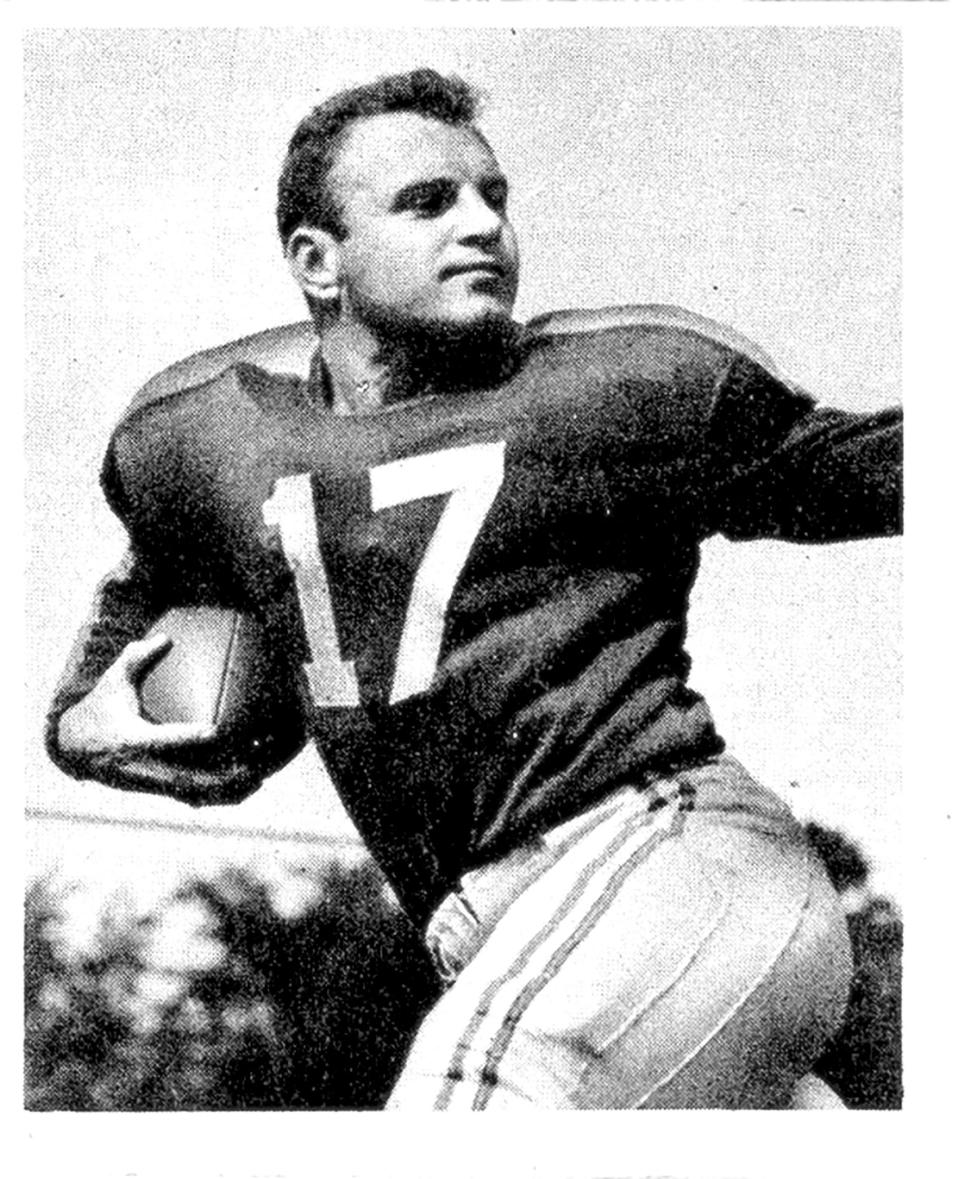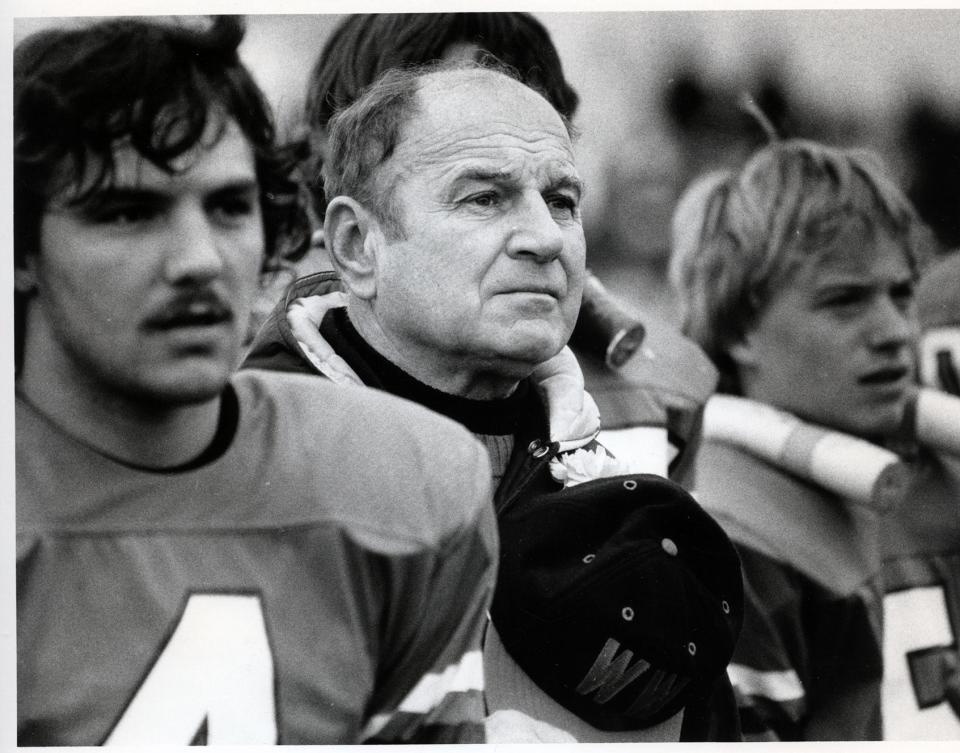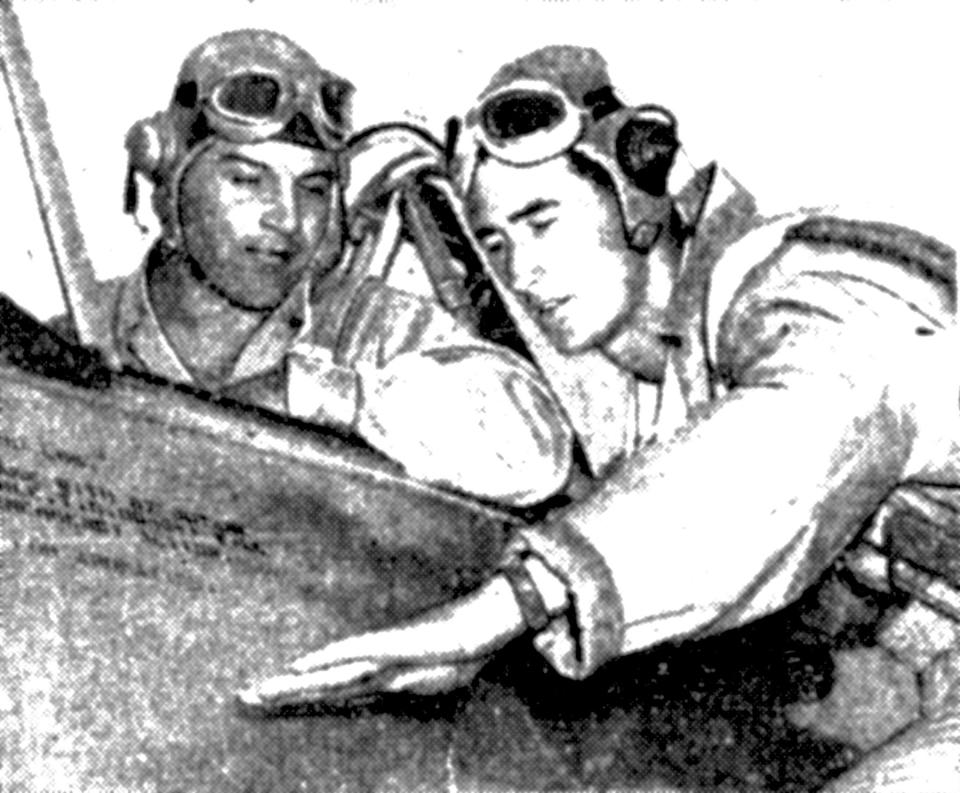Veterans Voice: NFL player, Navy pilot 'Monk' Maznicki left a mark as local sports legend
- Oops!Something went wrong.Please try again later.
A caption on a high school football photo caught my eye last week. It wasn’t the football action that drew my attention, but rather the fact that the photo was taken at West Warwick’s Maznicki Field.
That jogged a memory, so I started digging. The field is named for Frank "Monk" Maznicki, legendary football player and coach who was a lifelong West Warwick resident. When he died, his obit began, “Frank ‘Monk’ Maznicki, 93, of Coaches Court [West Warwick], made his final run to the end zone on Saturday, Dec. 14, 2013.”
Many know of Maznicki’s career as a local high school sports star, a college football All-American, an NFL player and finally, as a longtime West Warwick High School coach.
Fewer people know that his pro football career was interrupted for three years during World War II while he trained and served as a Navy pilot. Monk’s military service earns only the shortest of mentions in the numerous bios of him found online, and even his obituary gives it only brief acknowledgment.
Dec. 17, 2013: Rhode Island mourns Monk Maznicki

Setting the table
Frank Maznicki was born in West Warwick on July 19, 1920. His parents, Stanislaw and Eleanor Maznicki, had both been born in Poland.
He went to West Warwick High School and made the football team but sat on the bench until the last game of the 1935 season. West Warwick had a 1-6 record going into the final game against Classical. Backup Maznicki finally saw his first action and made the most of it, scoring a TD and kicking the extra point for a 7-7 tie.
According to his daughter Cheryl Maznicki Drozdz, he earned the nickname “Monk” from his teammates because he was so quiet. A Providence Journal sports reporter referred to him as “The Meandering Monk of the Pawtuxet Valley” in 1937, and the moniker stayed with him the rest of his life.
The next two years, led by Maznicki, the team went 19-0-1. He graduated in 1938 and parlayed his athletic prowess into a scholarship to then-national power Boston College, where he played football and baseball.
He starred as a halfback and was an excellent placekicker for the Eagles, playing on the 1939 team that reached the Cotton Bowl, only to fall 6-3 to Clemson. The following year (1940), he helped propel BC to its one and only national championship. The Boston College squad capped the season with a 19-13 win over Tennessee in the Sugar Bowl.
Despite his small size (5-10, 174 pounds), Monk led the Eagles in scoring his junior and senior seasons; his career mark of 6.61 yards per carry is still the best in BC history. He was named an All-American in 1941. National pundits have since called him “the best player on the best team BC ever had.” Maznicki “put the little town of West Warwick in the national news spotlight,” according to The Providence Journal. He was selected by the Chicago Bears in the 1942 NFL draft.
'What can I do to help?': RI doctor, who did not join the military until he was 58, went to Ukraine

NFL career interrupted by military service
Maznicki left home in early August of 1942 to join the Bears camp in Chicago. Shortly thereafter, he and three other NFL players signed up to be Naval Aviation Cadets.
They were not called up right away, however, and Maznicki established himself as one of the best young players in the NFL. He earned All-Pro honors playing halfback and doing the placekicking for the Bears. Monk led the league with 6.3 yards gained per try, setting an NFL record.
The undefeated Bears reached the NFL Championship Game but were stunned, 14-6, by the Washington Redskins who were three touchdown underdogs.
Maznicki was called into service in the spring of 1943. He was offered a commission to join the Navy as a physical training instructor, but he declined in favor of pursuing flight training.
He was assigned to the Navy pre-flight school at the University of Iowa. According to the November 2017 edition of Iowa Alumni Magazine, the Navy rented part of the campus as a training school for 1,900 aviation cadets.
“Quadrangle and Hillcrest residence halls became naval barracks, and aviation cadets soon filled much of the Field House and several acres of west campus playing fields. Over the next three years, more than 21,000 men went through pre-flight training in Iowa City — once referred to as the 'Annapolis of the Midwest' — before heading to primary aviation training and naval bases, ships, and cockpits overseas.”
For three months, cadets received instruction in military tactics, academics, and athletics. Subjects such as basic aerial navigation and communications prepared them for actual flight training.
The Navy believed the “rigors of college football” were ideal preparation for WWII. Professional athletes and coaches were recruited as instructors. The ban on professionalism was lifted for the war, and many played on the football teams of their respective schools.
Veterans Voice: Providence VA physician studies malnutrition's effect on veterans' health
Iowa Naval Pre-Flight Seahawks
This was the atmosphere in which Maznicki found himself as the 1943 football season began. Game after game, Maznicki excelled both running and kicking while his team rolled up one opponent after another — finding themselves ranked No. 2 in the country with only one game to go, against powerful and top-ranked Notre Dame.
Unfortunately, Maznicki suffered a knee injury in the game just before the showdown. He was unable to play in the finale, and the Seahawks lost a heartbreaker, 14-13.
'My friend Ted Williams'
Maznicki successfully completed his training at Iowa Pre-flight, and his next station was Bronson Field, part of the Navy’s flight training complex at Pensacola. At Bronson, he began serious flying and one of his flight instructors was a Marine Corps lieutenant named Ted Williams.
Daughter Cheryl still has Monk’s pilot logbook, which includes multiple entries reflecting dual flights with the Red Sox slugger.
Veterans Voice: Navy vet left his mark as a philanthropist

An Aug. 3, 1944 AP news story showed a picture of Maznicki in the cockpit, with Williams standing on a wing giving him advice. In the accompanying story, Williams was quoted as saying, “I gave him his first hop in his final squadron. He’s a swell flier, too.”
Maznicki earned his flight wings and commission as an Ensign in September 1944.
Maznicki and Williams also played on the same Navy baseball team. Ted even acknowledged that Maznicki outhit him on that Bronson Field team. They became lifelong friends; Frank’s daughter Cheryl recalls numerous family outings to Fenway Park as guests of Williams after the war. She also has a baseball inscribed to her brother Mike (now deceased) and her: “To Mike & Cheryl Your dad is a great pal. Your pal, Ted Williams."
The postwar years
In early 1945, Maznicki’s fighter squadron was moved to Hawaii in preparation for the final push against Japan. The war ended before he was deployed to the combat zone, and Maznicki finished his Navy flying career at Quonset Point. His last assignment was as a maintenance test pilot, doing check flights on F6F Hellcats and Corsairs. He was released from active duty in April 1946.
In all, Monk missed three professional seasons while training and serving as a Navy pilot.
Some years later, Bears coach George Halas was unable to attend a dinner at which Maznicki was to be honored, but the legendary “Papa Bear” wrote a letter for the event. It stated in part, “If his pro career had not been interrupted by his service hitch, I am positive he would have had additional seasons of productivity that would have put him up there with some of the all-time offensive leaders on the Bears.”
As it was, Maznicki returned to the Bears for the 1946 season. This time the Bears won the NFL championship, 24-14 over the Giants. Maznicki kicked a field goal and three extra points at the Polo Grounds.
A year later, the Bears sold him to the Boston Yanks, where he finished out his NFL career. In 1948 a teaching and coaching position opened at West Warwick High School, and he decided it was time to move on from the NFL. He was only 28 years old.
Maznicki never looked back. He quickly turned West Warwick into a local football dynasty, putting together a 52-game winning streak from October of 1948 to 1955. He won 17 Rhode Island state football titles, and his high school athletic field was renamed in his honor on Thanksgiving Day in 1983.
A few days later, in his final game, West Warwick posted one of the school’s all-time great victories with a 30-13 triumph over heavily favored Hendricken in the Division I Super Bowl. He ended his coaching career with a record of 256-79-15.
Making this record even more remarkable, West Warwick was punching well above its weight. R.I. Interscholastic League records show that West Warwick ranked 32nd out of 49 schools participating in boys’ sports, based on school enrollment. It was by far the smallest school competing in the state championship division.
“In the realm of Rhode Island sports over the past 70 years, nobody had more right to be called a legend than Monk Maznicki,” wrote The Journal's John Gillooly in December of 2013, shortly after Maznicki died at 93.
“Even in 2013, 75 years after he was a high school star, 60 years after he played in the National Football League and 30 years after he coached his last high school game, his name still had relevance to Rhode Island teenagers growing up in the second decade of the new millennium.”
I’m sure there are a number of other Rhode Island sports fields named for veterans or war heroes. If you know of one that might be deserving of a story, please email me at veteranscolumn@providenceJournal.com.
CALENDAR
Saturday, Sept. 24, 8 a.m.: Scuba diving at Fort Wetherill in Jamestown. Everything is free. If you are scuba certified, and would like to participate, call (401) 739-0167 or email Paul.Santilli@va.gov / Christopher.Morse@va.gov
(If you are not scuba certified, Providence Vet Center can also help you get qualified.)
Every Wednesday, 4:30-5:30 p.m.: Yoga group offered by the Providence Vet Center, 2038 Warwick Ave., Warwick 02889. Test your flexibility with Instructors from Shri Yoga. Everything is free. Vet Center eligibility required.
ANNOUNCEMENTS
Learn to play the acoustic guitar: This Providence Vet Center program is offered through a partnership with Guitars for Veterans. All participants are asked to complete 10 sessions, at the end of which they will be awarded a free acoustic guitar.
The program is very popular and there is a waiting list, so anybody who is interested should sign up sooner rather than later.
Vet Center eligibility required. Call (401) 739-0167 or email Paul.Santilli@va.gov
To report the outcome of a previous activity, or to add a future event to our calendar, please email the details (including a contact name and phone number/email address) to veteranscolumn@providencejournal.com
This article originally appeared on The Providence Journal: 'Monk' Maznicki: Chicago Bears player, Navy pilot, RI sports legend

